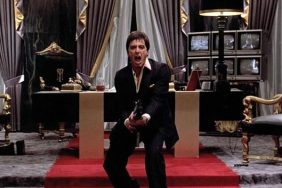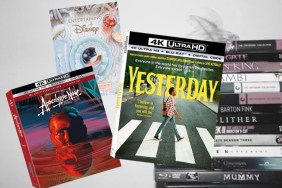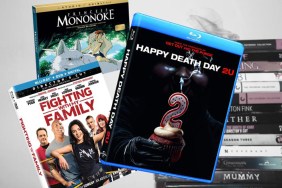
The opposite, however, can also be true. Sometimes too much silence is a bad thing, and a scene can live entirely on music. Watch this video from the 1982 classic E.T.: The Extra-Terrestrial. In the original scene, a young boy bids farewell to his beloved alien friend, and many children remember this scene as being touching and perhaps still possesses of the ability to make them cry. To prove a point, an enterprising young editor removed John Williams’ iconic score from the movie to prove how important the music was to the scene. Without the music, the scene plays out awkwardly and dry. There is no swell of emotions. There is no drama. It’s just a scene of people standing around a ship, watching as a little brown creature slumps up the ramp and flies away. When Dee Wallace cries in joy, it almost seems like a moment of madness. Like something out of a John Cassavetes movie.
Indeed, many of the well-known and iconic film composers (Williams, Bernard Herrmann, Ennio Morricone, Danny Elfman, Toru Takemitsu) are perhaps known less for their subtle use of silence in a movie, and more on their memorable, and even hummable movie theme tunes. Who doesn’t know the Superman theme? Or the use of strings in Psycho? Or the whistling from The Good, The Bad, and the Ugly? Any of these composers is perhaps skilled enough to know when a loud score is appropriate, when a quiet score is appropriate, and when no music at all may be needed.
Here’s a distressing trend: Most modern film scores no longer seem interested in presenting audiences with a theme they can sing along with. John Williams was the master of this, as you can hum Indiana Jones’ theme, or perhaps even Harry Potter’s. But can you hum for me the score for The Avengers? Spider-Man? Man of Steel? Those movies have large and utilitarian music, but there is nothing notable or hummable about them. I propose: If you can hum a movie’s theme, maybe it did a good job of making the film more memorable.

So yes, there are great scores that can only enhance the movie you’re watching. And there are times when less music is more appropriate. Like all things, it’s a matter of how it is used, rather than the mere fact that it is used.
I would prefer that filmmakers err on the side of silence. Usually a small and quiet moment can carry more heft than anything a loud score could. As a filmmaker, you need to decide not only what is appropriate for a particular scene, but how that one scene begins to interlock with the scenes around it. How does the music flow from scene to scene? Ultimately, how does the music marry into the drama as a whole? How much emotional weight do you want the music to lift? How much should it lift?

If you’re making an average melodrama, the same rule applies to the music as it does to special effects, showcase acting, a stellar cast, editing, and production design: It needs to serve the drama, and not the other way around. The drama of the scene is what needs to come first, and the overall drama of the whole film. A great score is only going to be great if it’s used right. Some films call for a lot of music (an animated sequence with silent characters only lives by its score; see Carl Stalling). A film with dialogue and drama will likely be better served with only an occasional score. A film about realism, discomfort, natural reactions, speeches, or dread will be better served by quiet.
Homework for the Week:
What are your favorite movie composers? What makes them good? The next movie you watch, pay attention to how the music is used. How often are there quiet moments? Would certain movies be better served by more quiet moments? With less? Watch your favorite movie (provided it is a talkie) with the sound turned off. If it’s a DVD, turn on the subtitles. How well do you think the film works without the music? How many films are better told visually without music? How many require it as part of the drama?
Witney Seibold is a featured contributor on the CraveOnline Film Channel, co-host of The B-Movies Podcast and co-star of The Trailer Hitch. You can read his weekly articles Trolling, Free Film School and The Series Project, and follow him on “Twitter” at @WitneySeibold, where he is slowly losing his mind. If you want to buy him a gift (and I know you do), you can visit his Amazon Wish List.








